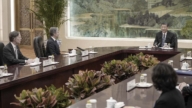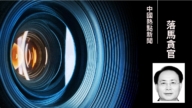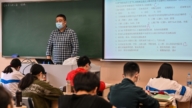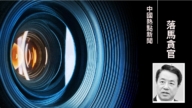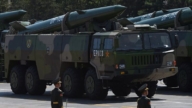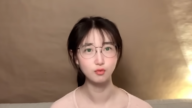【新唐人2013年04月09日訊】中共中央政法委4月7號在官方網站公布了最新組成人員,由11人組成的新一屆中央政法委陣容正式亮相。由於中央政治局委員孟建柱繼任政法委書記,打破了以往由中共常委出任的慣例,因此外界認為當局對政法委的安排出現了新變化。而新一屆的政法委總體人員又有甚麼變化呢?一起來看看。
經過去年中共十八大及今年全國「兩會」兩次大的調整,新一屆政法委陣容的11人之中,包括中央政治局委員、中央政法委書記孟建柱、國務委員兼公安部部長郭聲琨、最高人民法院院長周強、最高人民檢察院檢察長曹建明。
其餘7名委員中,則包括5位正部長級高官及兩位現役上將,有中央政法委秘書長周本順、國家安全部部長耿惠昌、司法部部長吳愛英、公安部黨委副書記兼副部長李東生、總政治部副主任杜金才上將、武警部隊司令員王建平上將、中央政法委副秘書長兼中央綜治辦主任陳訓秋。
已經當選全國人大常委會副委員長的王勝俊不再擔任政法委委員。但已經調任河北省委書記的周本順,則仍然保留在政法委領導層中,預計後續將繼續調整。
中央政法委書記過去曾三度由中央政治局常委兼任。去年十八大之後,孟建柱繼任政法委書記,改變了這一做法。
因此,外界有輿論說,中共適應民意,而使得政法委出現了一些變化。不過,時事評論員劉淇昆認為,並非如此。
時事評論員劉淇昆:「政法委是共產黨的暴力鎮壓機器的一個指揮機構,這個暴力鎮壓機器的指揮機構,對於共產黨的生存,對於共產黨的統治是非常重要的。因此我認為人民群眾對政法委是痛恨的,所以政法委的負責人,官職大一點,官職小一點,這不是老百姓真正關心的,也談不上老百姓同意不同意、甚麼符合不符合民意。」
中共中央政法委,是中共領導和管理政法工作的職能部門,從宏觀上組織領導公安、國家安全、司法、法院、檢察院等各政法部門的工作,並指導各省區市政法委的工作。
中國不少老百姓及民主人士,一向視「政法委」為「敵人」,民間要求取消政法委的聲浪不斷,但是劉淇昆指出,在中共統治下這是不可能的,因為中共的專政機器需要它來協調。
而時事評論員林子旭分析,政法委的變化,說白了就是背後當家老大的人選的變化,本質上沒有任何改變,真正掌控政法委的人,還在政治局常委裏面。
時事評論員林子旭:「政法委書記的級別雖然有所降低,但是新一屆政法委依然涵蓋了公檢法司等所有對民眾實施專政的機構。它對中國老百姓專政的能力一點兒沒有減弱。有人說周永康下去了,政法委可能會有一些變化,這些想法都是不現實的。」
有報導宣稱,最高法、和最高檢的掌門人周強、及曹建明,都是著名法律院校畢業的法學碩士,這也是「兩高首次出現雙碩士」局面。因此,新一屆政法委陣容,兼顧了法學科班出身的官員與政法一線實務幹部。
但劉淇昆觀察分析,目前的變化,絕不是當局要對人民實行仁政或者政改,很可能是由於黨內權力鬥爭的需要。
時事評論員劉淇昆:「以前周永康是政治局常委,他政法委,管公檢法,同時管武警。這樣他手中權力過大,可能別的政治局常委,甚至黨的總書記,認為對自己的地位、對自的權力是一個威脅,因此到這一屆,政法委書記他的官職降低了,這個我覺得主要還是從黨內權力鬥爭,從黨內權力分配這個角度去考慮的。」
林子旭指出,這些年,政法委在鎮壓民眾的過程中不斷坐大,成為了黨、政、軍三權之外頗有實力的第四權,這個權力最終也必然要歸到中共黨魁手中,因此,下面的政法委書記不過是一個擺設罷了。
採訪/常春 編輯/王子琦 後製/陳建銘
New Lineup of China´s Political and Law Commission
On April 7th, The Chinese Communist Party (CCP) announced
its new members of the Political and Law Commission (PLC).
Within the 11 members, Meng Jianzhu from the Central
Committee will be the secretary of the new PLC.
This has broken the convention, which a member of
the Standing Committee was the secretary of the PLC.
Observers think that the CCP has
changed the makeup of the PLC.
Let´s find out what other changes has been made.
After the 18th Congress and the two sessions,
the CCP has made two major adjustments.
The 11 members of the new PLC include Meng Jianzhu,
Central Political Commission member and secretary of the PLC;
Guo Shengkun, a State Councilor member and
director of the Ministry of Public Security;
Zhou Qiang, director of the Supreme People’s Court;
and Cao Jianming, director of the
Supreme People’s Procuratorate.
The remaining seven members include
five high level officials and two active duty generals.
They are Zhou Benshun, secretary of
the Central Political Commission,
Geng Huichang, secretary of Public Security;
Wu Aiying, director of the Ministry of Justice;
Li Dongsheng, deputy secretary and
deputy director of the Ministry of Public Security;
General Du Jincai, deputy director of the
General Political Department;
General Wang Jianping, commander of the
Armed Police Force;
And Chen Xunqiu, deputy secretary of the Central
Political Commission and director of the Central
Commission for Comprehensive Management.
Wang Shengjun, who has been elected vice chairman of the
Standing Committee of the National People’s Congress,
will no longer serve as a member of the PLC.
Zhou Benshun, the Hebei Provincial Party Committee
Secretary, will retain leadership of the PLC.
This last change is expected to be adjusted later.
In the past, the secretary of the central PLC was headed
by a member of the Politburo Standing Committee,
but Men Jianzhu changes that.
Thus, some observers think that the CCP did it
in order to cater to public opinion.
However, Liu Qi Kun, political commentator,
does not agree.
Political commentator Liu Qikun: “The PLC is a command
structure of the CCP´s violent suppression machine.
It is very important for the CCP´s survival and rule.
I believe the Chinese people hate the PLC so much that
they don´t care who the officials of the PLC are.
Of course, that also means the CCP does not need to comply
with public opinion—either consent or disagreement.”
The PLC serves as management unit of the
CCP´s political and legal work.
From a broad view, it is the leader for departments of
public security, national security, justice, the courts,
this includes work of the Procuratorate, as well as
branch PLC in provincial and autonomous regions.
Many Chinese people and democratic activists
have taken the PLC as their enemy.
They have continued to ask for the removal of the PLC.
However, Liu Qi Kun points out that it is impossible
because the CCP dictatorship needs it to rule.
Political commentator Lin Zixu analyses that the
changes of the PLC are only due to changing of leadership.
The nature of the CCP remains the same.
The control is still in the Central Standing Committee.
Lin Zixu: “The secretary of the PLC may be at a lower level.
However, the new PLC is still above all
the controlling units of the regime.
Some people say that without Zhou Yongkang, the PLC
will show changes. These ideas are not realistic at all.”
Some reports claimed that Zhou Qiang and Cao Jianming,
supreme law, and the head of the Supreme People ‘s
Procuratorate both graduated from a famous law school
with advanced degrees.
Therefore, the new lineup of the PLC with officials from
Law school will become the front-line practicing cadres.
Liu Qikun points out that the current changes are not
due to a benevolent government or political reform,
but more likely due to needs arising from
the power struggle within the party.
Liu Qikun: “When Zhou Yongkang was a member of
the Politburo Standing Committee, he was also in control
of the armed police.
Thus, he was a threat not only to other members of
the Politburo Standing Committee but also
to the General Secretary of the CCP.
Now, the PLC secretary´s power is reduced.
I believe that it is the result of a power struggle
within the party.”
Lin Zihu also points out that during these years of
suppressing people, the PLC´s power has continued to grow.
It has become a fourth power besides the party,
political and military powers.
This fourth power eventually has to go back to
the General Secretary of the party,
so the secretary of the PLC is nothing
but a decorative piece.


